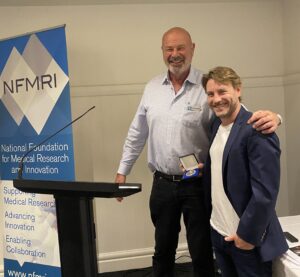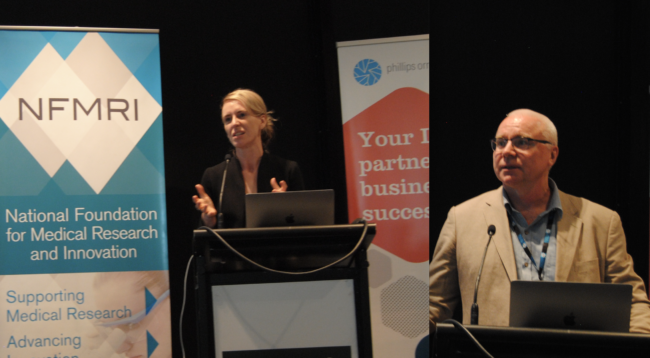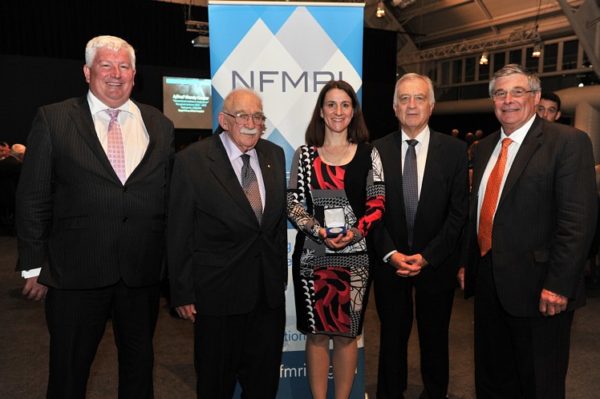2024 Dr John Raftos AM Award Winners: Prof. Michael Good AO and Prof. Peter van Wijngaarden
Prof. Peter van Wijngaarden and Prof. Michael Good AO were the recipients of NFMRI’s 2024 Dr John Raftos AM Award for Advancing Innovation. The Board of NFMRI awarded the medal to Prof. Good for the significant advancement of both the malaria and group A streptococcus vaccines supported by NFMRI, as well as to A/Prof van Wijngaarden for the translation of his state-of-the-art retinal camera prototype via the establishment of spin-off company “Enlighten Imaging”. Both candidates have achieved tremendous success in their own right, and as both were equally worthy of the Award, it was resolved by the Board to present two Awards in 2024. Each recipient received a prize of $50,000 in the form of a research grant to continue supporting their research activities.
Some of the key highlights from both recipients can be found below:
1. Prof Michael Good AO, Griffith University “Producing and testing a GMP grade peptide conjugate vaccine to prevent infection with group A streptococcus”, $251,000 over three years (2015-2017) Indication: group A streptococcus | Type: vaccine
Key outcomes/outputs to date include:
- Leveraged $3,500,000 from the Heart Foundation
- Leveraged over $750,000 of funding from external sources, including Lowitja, Snow Foundation etc.
- $550,000 in funding and over $500,000 in kind to fund a Phase 1 clinical trial from the Li Ka Shing Institute (Canada)
- Investment from industry
- Currently in Phase 1 clinical trial overseas
- Anticipated commercialisation through Australian NewCo establishment in 2023/24
“Manufacture and evaluation of a chemically attenuated Plasmodium falciparum whole parasite blood- stage malaria“, $200,000 (2018-2021)
Indication: malaria | Type: vaccine
Key outcomes/outputs to date include:
- Rotary Health grant, $1,035,648
- Medical Research Future Fund, $500,000
- Private trust funding, $570,000
- Private philanthropic donor, $372,027
- Griffith University funding, $334,968
- Collaborating with industry and currently in clinical trial
2. Prof Peter van Wijngaarden, Centre for Eye Research Australia “Translating an eye imaging biomarker for Alzheimer’s disease to the clinic”, $250,000 from 2019-2021
Indication: Alzheimer’s disease | Type: Device
Some of the key highlights from this project’s progress include:
- BioMedTech Horizons 2.0 grant, $1,000,000
- NHMRC research grant, $1,400,000
- Funding from multiple external sources, $2,600,000
- Well advanced camera prototypes
- Strong IP position
- Spin-off company “Enlighten Imaging”
- Has garnered support from the likes of Bill & Melinda Gates and Jeff Bezos via the Alzheimer’s Drug Discovery Foundation
2022 Dr John Raftos AM Award Winner: Prof Nicholas Opie

Prof Nicholas Opie is the recipient of NFMRI’s 2022 Dr John Raftos AM Award for Advancing Innovation. The Board of NFMRI awarded the medal to Prof Opie following his outstanding contribution to biomedical innovation advancement with the StentrodeTM developments.
Prof Opie’s project received funding in 2017- 2018 from NFMRI to support safety validation of the StentrodeTM, which was developed in partnership with A/Prof Thomas Oxley at The University of Melbourne.
The StentrodeTM is an endovascular brain-computer interface that can record electrical neural signals from within a blood vessel. This technology is designed to restore instrumental activities of daily living in people with paralysis by sensing brain activity and translating these signals into discrete electrical commands which enable direct brain control of computers and assistive technology.
Since 2019, the StentrodeTM has been successfully implanted into four participants with severe paralysis due to motor neuron disease, enabling them to control a computer with their mind. Following a brief training period, the patients were able to use the system independently and at home to communicate using emails, text and messaging applications and complete daily tasks such as online banking and shopping.
“The grant from the NFMRI helped us at a critical time in the development of the Stentrode and led to an increased understanding about the way BCIs can assist patients regain functional independence in their lives. We have a brilliant team of researchers and clinicians working with us to develop this technology which will truly help people with neurological disease. I am honored to receive the Dr John Raftos AM Award for Advancing Innovation on behalf of Synchron” Prof Opie said.
The StentrodeTM has also been granted Breakthrough Device designation by the U.S. Food and Drug Administration (FDA), a status reserved for innovative solutions addressing irreversibly debilitating conditions.
This research is now being led by the neurovascular bioelectronics medicine company, Synchron, Inc., which Prof Opie co-founded and directs with neurointerventionist A/Prof Thomas Oxley. Synchron is pioneering the development of Neuro Electrophysiology (NEP) solutions for a range of neurological conditions. The development of this technology platform was enabled by early funding from the U.S. Defense Advanced Research Projects Agency (DARPA) and the U.S. Department of Defense (DoD), among other competitive Australian grants. Synchron has raised over AU$70M since company formation, and is poised to conduct an early feasibility study in the USA.
Headquartered in Brooklyn, New York, with presence in Silicon Valley, California, and R&D facilities in Melbourne, Australia, they have realised clinical utility of the world’s first endovascular neural interface. Through private funding and the award of competitive grants including an NHMRC Fellowship (Opie), the University of Melbourne and Synchron will continue translation of their technology to restore independence and communication to people with paralysis, while also conducting ground-breaking Australian research enhancing the capabilities of the StentrodeTM system to treat other neurological conditions such as epilepsy, depression and Parkinson’s disease.
Other key highlights arising from this grant include:
- Synchron receiving nearly $1 million in funding from the Medical Research Future Fund
- $1.5 million NHMRC grant received by the University of Melbourne to expand the clinical study of the StentrodeTM
Following the completion of a successful first-in-human trial evaluating the safety and efficacy of the StentrodeTM to restore communication and independence to those severely paralysed by enabling direct brain control of a computer, Prof. Opie will be allocating his Medal prize towards expanding the potential clinical applications of his technology through development of a StentrodeTM suitable for efficacious cortical stimulation.
“By combining our ability to record information from the brain with technology that can deliver information to the brain, we can offer hope to treating a wide range of previously untreatable neurological conditions” said Prof. Opie.
2020 – A/Prof Bernard Flynn, Monash University and A/Prof Lenka Munoz, The University of Sydney
The National Foundation for Medical Research and Innovation was pleased to offer the second Dr John Raftos Award to both A/Prof Bernard Flynn from Monash University and to A/Prof Lenka Munoz from The University of Sydney.

A/Prof Lenka Munoz, The University of Sydney, Improving chemotherapy response rates in brain cancer
- The innovation has been licensed to an industry partner
- More than $1m in research funding has been directed towards this project with A/Prof Munoz’ labs
- Since receiving this grant, Lenka has secured tenure and been promoted to Associate Professor
- In 2018, they were awarded a $550k development grant from the NHMRC for preclinical development of the 2nd generation drug candidates
A/Prof Lenka Munoz received support from NFMRI from 2013 to 2016.
In a search for ways to limit the spread and to stop lethal recurrence of brain cancer, Dr Munoz’ research focuses on the inflammation caused by the tumour as a key to brain cancer progression. This research has found that cells surrounded with inflammation appear to move farther because the inflammation makes it easier for tumour cells to propel themselves through tissue. The more inflammation in the proximity of a tumour cell, the faster glioblastoma cells travel. This project will make this the first group to report that drugs turning off the activity of an inflammatory protein called MK2 are effective in blocking inflammation in brain tumours. Blocking inflammation may prevent the invasive spread of cancer cells into healthy brain tissue, thus preventing the formation of novel tumours and potentially improving patient’s response to temozolomide (Temodal) during chemotherapy. NFMRI funding enabled A/Prof Munoz to generate intellectual property, which was subsequently licensed to an industry partner and they are currently collaborating on pre-clinical development. With the molecule progressing towards clinical trials, A/Prof Munoz hopes that soon they will be able to offer patients with fatal brain tumours an effective treatment.
A/Prof Munoz has advised that in regards to the brain cancer drug discovery project, she was successful with an NHMRC Development Grant (CIA) and another two IPs were recently licensed to industry. She confirmed that clinical trials are planned for 2020.
A/Prof Bernard Flynn, Monash University, Novel agents for the treatment of cardiac fibrosis
- Established a spin-off company Cincera Therapeutics Pty Ltd
- $7m series A investment
A/Prof Bernie Flynn was supported by the NFMRI in 2016-2017, to assist in the optimisation and evaluation of a new class of drug molecules that influence lipid (fat) metabolism. Certain fats are known to contribute to disease more than others, promoting diseases such as type-2 diabetes, fatty-liver disease, heart disease, chronic kidney disease and cancer.
The research undertaken by A/Prof Flynn’s group has resulted in the identification of a key enzyme in lipid metabolism that produces lipid metabolites (toxic fats) that are important in promoting the onset and progression of these diseases. They have also developed drug molecules to intercept this enzyme and reduce the production of toxic fats and promote the formation of good fats, that is, fats that actually reverse the disease process!
The NFMRI funding was awarded to the A/Prof Flynn’s research group to help fund access to contract research organisations and other collaborators necessary in providing critical data to help A/Prof Flynn’s group optimise their drug molecules, so as to afford a safe and effective drug molecule that can be administered orally.
These activities are not usually supported by Government research funding bodies, such as the NHMRC.
The work funded by the NFMRI has been successful and A/Prof Flynn’s group now has a set of drug molecules that are effective in blocking this enzyme and from oral administration. These drug molecules are currently undergoing further optimisation and preclinical development in the expectation of nominating the best performing drug molecule to progress to the clinic.
This research has attracted considerable interest from potential commercial partners and it is expected that in the very near future that a commercial partner will provided the funding required to bring the program into the clinic.
2018 – A/Prof Wendy Cooper, Royal Prince Alfred Hospital
The National Foundation for Medical Research and Innovation was pleased to offer the inaugural Dr John Raftos Award to A/Prof Wendy Cooper, from the Royal Prince Alfred Hospital.

A/Prof Wendy Cooper is a staff specialist in tissue pathology and diagnostic oncology at Royal Prince Alfred Hospital in Sydney with a special interest in lung cancer and lymphomas. Between 2012 – 2015, A/Prof Wendy Cooper received two grants totalling $220,000 to support research focussed on lung cancer and identifying biomarkers that could predict responses to particular treatments – i.e. personalised medicine. This is important as some lung cancer patients with specific changes in the genes of the cancer cells could be targeted with new smart drugs that are more effective and had less side effects than traditional chemotherapy. Funding from the Foundation was provided to enable A/Prof Cooper to collaborate with bioinformatics experts and since then her team studied a group of lung cancer cases that could be targeted by new drugs. An important outcome of this research has been the approval of new therapies and concurrent diagnostics by the Medical Services Advisory Committee and the Pharmaceutical Benefits Advisory Committee (PBAC). Her data has been used by Pfizer and other pharmaceutical companies for this purpose.


